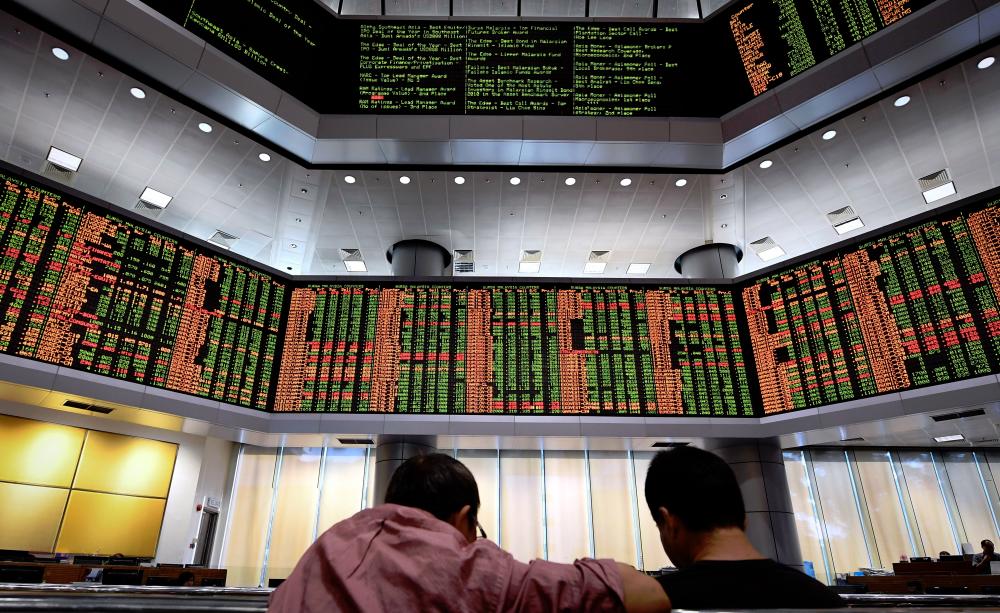PETALING JAYA: While the measures announced by Prime Minister Tun Dr Mahathir Mohamad at Invest Malaysia 2019 on Tuesday are long-term positive, they have failed to excite the local stock market, which saw a decline of 0.4% in the FBM KLCI in the past two days.
“The market is seemingly unenthused, with the FBM KLCI slipping 3.26 points (0.2%) on the day (Tuesday) though this could be just as much due to regional lethargy as investors keep a wary eye on central banks (US, UK, Indonesia and Thailand, among others) who are meeting this week to discuss monetary policy,” said PublicInvest Research.
Today, the key index ended 3.47 points or 0.21% lower at 1,684.21 points.
The research house noted that trade-related uncertainties between the US and China as well as issues surrounding Brexit have resulted in jittery markets for the near term.
“That said, Malaysia’s performance leaves little to be desired, the benchmark FBM KLCI being the significant underperformer (year to date) in the Asian continent,” it said in its market strategy report.
PublicInvest said that detractors will blame the domestic market’s underperformance on the new government’s inexperience or lack of economic thrust, using this as fodder for criticisms and brickbats.
“While it may partially be so, we think this more as a cup half full situation, in that there remains ample scope for a significant catch-up in performance. Reforms are underway. Results are starting to show, slowly but surely. The FBM KLCI had seen an uptick mid-February for no apparent fundamental reason apart from an improvement in sentiment,” it added.
In the short term, sentiment may still be lifted by liquidity-driven infusions into the market, gradual appreciation in crude oil prices and clarity on economic growth prospects.
PublicInvest Research said the measures announced by Mahathir are long-term positive, which reinforces its optimism in the market over the longer term.
However, expectations are short-term, with no immediate market-moving measures mentioned or tangible impacts to the investment community for now, with the exception of the government’s decision to list mature entities on the stock market and for government-linked companies (GLCs) to reduce their shareholdings in public-listed companies.
“GLCs are likely to include Khazanah Nasional, Felda and Petronas. The sheer size of GLC holdings in many entities in itself may already have some effect on markets despite efforts to contain as such, depending on the depth of asset sale,” it added.
At end-2018, PublicInvest Research suggested entry into smaller-capitalised stocks as valuations looked compelling at that point, but noted that the small cap index and stocks now look less compelling although there remains value to be found. Its end-2019 target is 1,750 points.
“We think the larger-capitalised names may now offer greater security in liquidity given current uncertain times, with valuations also relatively appealing vis-a-vis the other sub-indices which are all trading at respective long term averages,” it said.
Meanwhile, MIDF Research has maintained Malaysia’s economic growth forecast at 4.9% year-on-year for 2019, driven by the upbeat performance of domestic and external trade sectors. It reiterated its end-2019 FBM KLCI baseline target of 1,800 points.
It said that clarity in domestic policy direction will lend support to both domestic and external sectors, while the new economic direction will have significant impact on overall business confidence and investment flows.
“We foresee geopolitical events to cast a shadow on investors’ sentiment on our equity market. Nevertheless, we opine that corporate Malaysia will still see decent earnings growth,” it said in its 2019 outlook report.
The aggregate 2019 earnings estimate of the FBM KLCI constituents under MIDF Research’s coverage was shaved by 3.9% as overall corporate earnings for 2019 are expected to be lower than earlier anti-cipated, but would still deliver positive on-year growth.
“The lowered earnings target is deemed achievable as it is supported by a still healthy domestic macro picture with GDP growth expected at 4.9% this year,” it said.
MIDF Research expects Malaysia to remain on the expansionary path for the first half of 2019, with overall business performance expected to show modest improvement while private consumption and services sector are projected to expand by 7.5% and 6.2% respectively this year.










